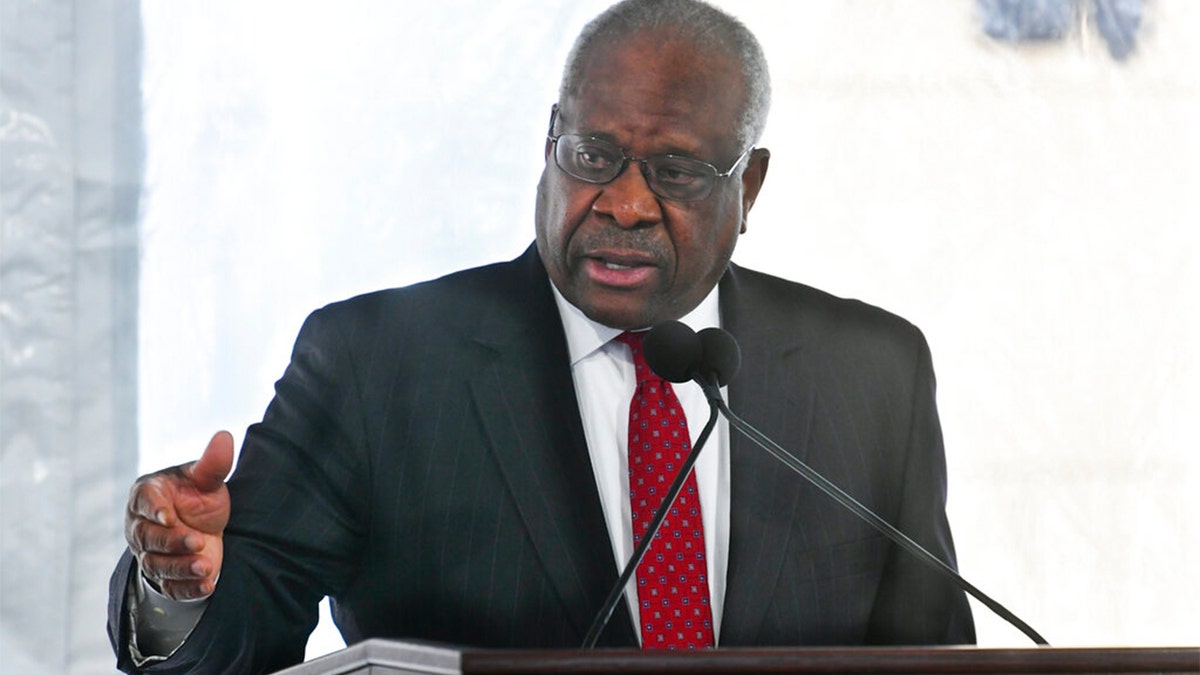Hemingway: Why the Left can't stand Clarence Thomas
Clarence Thomas is one of the greatest Americans, says Mollie Hemingway on 'The Ingraham Angle.'
If he's impeached by House Democrats, Justice Clarence Thomas would be the second Supreme Court justice ever to receive such a harsh sanction from Congress.
"Clarence Thomas should resign," Rep. Alexandria Ocasio-Cortez, D-N.Y., tweeted Tuesday. "If not, his failure to disclose income from right-wing organizations, recuse himself from matters involving his wife, and his vote to block the Jan 6th commission from key information must be investigated and could serve as grounds for impeachment."
Several other Democrats are joining Ocasio-Cortez in calling for Thomas to resign, including Rep. Betty McCollum, D-Minn., as recently as Wednesday. Rep. Ilhan Omar, D-Minn., called on Thomas to be impeached as early as last Saturday.
These calls come after texts between Thomas' wife, Virginia, and former White House chief of staff Mark Meadows revealed she urged former President Donald Trump's advisers to try to overturn the 2020 election. Democrats are most upset over the fact Thomas participated in a case regarding the House Jan. 6 Committee despite his wife's involvement in those efforts.
Thomas would join Justice Samuel Chase as the only Supreme Court justices ever impeached if Democrats follow through on their threats.
It's not clear there's enough political momentum behind those calls for a Thomas impeachment to actually happen. But the Chase impeachment may serve as a playbook for Democrats on how to get what they want out of such an effort without actually removing a justice.
The Chase impeachment happened in the wake of the 1800 presidential election when Jeffersonian Republicans swept into power in the presidency and in Congress. This left the judiciary as the last bastion of Federalist power in the government, which became a political target for Jeffersonian Republicans.
"The Chase impeachment does reflect a kind of political push by the Jeffersonian Republicans, by his allies in Congress against the kind of Federalist bastion of power in the Supreme Court," R Street Institute resident senior fellow for governance James Wallner told Fox News Digital.

Supreme Court Justice Clarence Thomas delivers a keynote speech during a dedication of Georgia's new Nathan Deal Judicial Center in Atlanta, Feb. 11, 2020. (AP Photo/John Amis, File)
SENATE DEMOCRATS PUSH CLARENCE THOMAS TO RECUSE HIMSELF FROM JAN. 6 CASES
Chase was loudly pro-Federalist and campaigned for John Adams in the 1800 presidential election, according to the Congressional Research Service (CRS). The House eventually voted to impeach Chase in 1804 for a variety of alleged misdeeds largely related to his politics.
A majority of senators voted to convict Chase in his Senate trial the next year. But the body did not reach the two-thirds threshold to convict, owing at least in part to decisions by some senators that a justice shouldn't be impeached over politics, according to the CRS.
But Wallner said in his reading of the Constitution, there's nothing that says this Congress can't impeach someone for politics – and that Democrats could impeach Thomas for alleged political reasons if they want.

Engraved portrait of American jurist, delegate to the Continental Congress, and signer of the Declaration of Independence Samuel Chase (1741-1811). Chase served as an associate justice of the U.S. Supreme Court from 1796 to 1811 and, because of his Federalist leanings, was the victim of a partisan attempt to impeach him. (Stock Montage/Getty Images)
"Can you impeach someone… for their relationship to their spouse? For the things that their spouses say and do? I mean, you probably shouldn't," Wallner said. "But of course you can."
Wallner said even if an impeachment never materializes, Democrats may still get what they want – less political involvement from Virginia Thomas, or less Supreme Court involvement with 2020 election cases – just by talking about it.
"Moving forward, even if the Democrats don't try to mount an impeachment of Clarence Thomas because of what his wife has done, then that doesn't mean that… the effort or the talk won't have an impact on either's behavior," Wallner said.
One example of the Jeffersonian Republican pressure having an effect on the Supreme Court in Chase's day, Wallner said, was the famous Marbury v. Madison case.
"[Federalist Chief Justice] John Marshall… one of the problems that he faces is how does he get out of Marbury v. Madison without pissing off Congress and getting impeached himself?" Wallner said.

Ginni Thomas, wife of Supreme Court Justice Clarence Thomas and a special correspondent for The Daily Caller, speaks at the Conservative Political Action Conference (CPAC) in Oxon Hill, Maryland, on Feb. 23, 2017. (AP Photo/Susan Walsh, File)
JUSTICE THOMAS PARTICIPATES IN ARGUMENTS REMOTELY AFTER LENGTHY HOSPITAL STAY
Marshall's solution was to rule that William Marbury, appointed by the lame-duck Adams, deserved his judicial commission, which was being withheld by Jefferson's Secretary of State James Madison. But, Marshall further ruled, the law under which Marbury brought his case to the Supreme Court was unconstitutional and therefore the court could not order the new Jefferson administration to give him his commission.
The long-term effect of the ruling was to enshrine judicial review in the United States' constitutional structure. But the short-term political fallout, Wallner said, was that Marshall avoided the wrath of the Jeffersonian Republicans.
"I think that… is directly related to and informed by the climate of the era and the effort to impeach Chase and other federal judges," Wallner said.
As another example of political pressure swaying Supreme Court justices, Wallner pointed to the "Switch in Time that Saved Nine" in the 1930s.
CLICK HERE TO GET THE FOX NEWS APP
As former President Franklin Delano Roosevelt pushed a court-packing scheme because the Supreme Court struck down his policies, the justices appeared to suddenly start upholding his policies.
This took the steam out of Roosevelt's court-packing effort. But it also helped the president leave a permanent mark on U.S. society through his New Deal.
It's not clear if any cases Thomas may hear regarding the Jan. 6 Committee or the 2020 election could have that kind of significance. But Democrats are making clear they want him gone nonetheless.
"Virginia Thomas’s involvement in the attempt to overthrow the 2020 presidential election, and the subsequent efforts by Justice Thomas to cover up his wife’s actions, have rendered the associate justice ethically compromised and thus unfit to be a neutral arbiter of justice," McCollum said Wednesday.
Fox News' Remy Numa contributed to this report.






